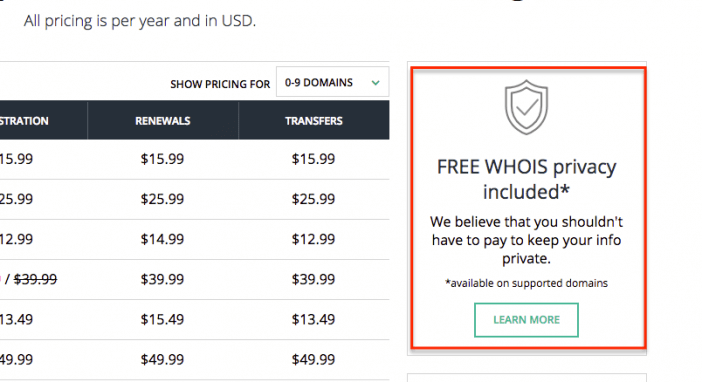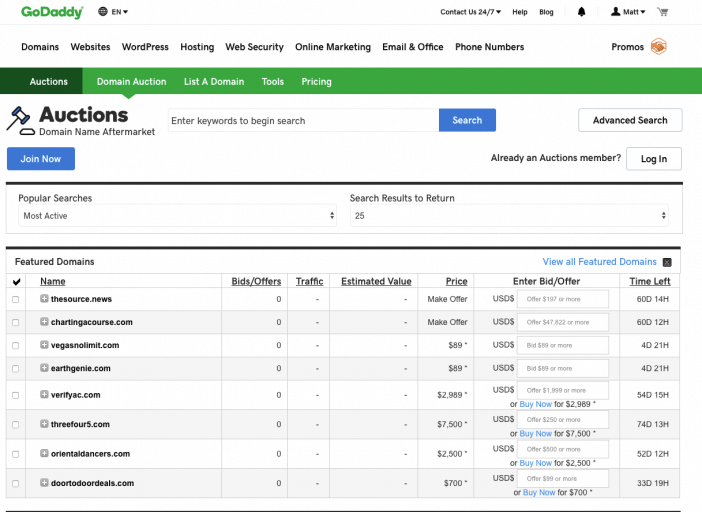Domain Names are human-readable words (e.g., amazon.com) that direct a web browser to specific files on a specific server.
As an analogy, a domain is like a physical address… but on the Internet. Like a physical address, they don’t really do anything on their own, but they are critical to understanding when you are building an online project.
That’s the short version. But there’s more to domains & domain registration than the definition.
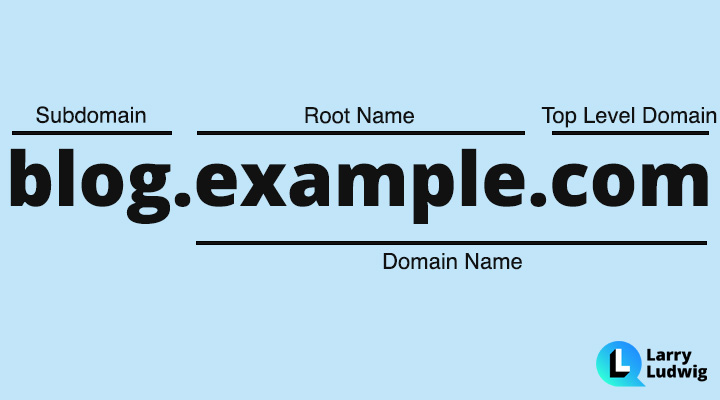
What is a domain name in technical speak?
The Internet is nothing but a bunch of connected devices with IP Addresses (usually a series of numbers like 192.168.0.1). IP Addresses are not only hard to remember, but they change frequently.
A domain name is a human-readable series of letters that get matched with an IP Address so that a person operating a browser will find the device (usually a server with files) that they want to find.
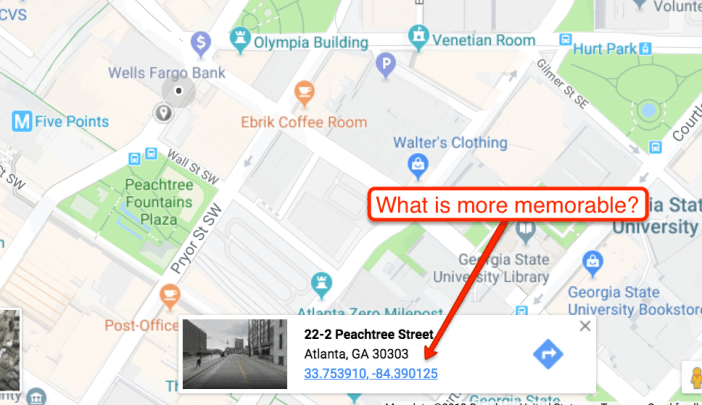
In the physical world, the analogy is that Addresses are to Domain Names what Geo Coordinates are to IP Addresses.
Now – you can take this analogy pretty far, and it answers quite a few common questions. For example, like physical addresses,
- Domain Names are mainly for convenience and memorability. You don’t have to have one…but it makes finding your work *much* easier.
- Domain Names can have prestige based on neighborhood. Everyone knows 5th Avenue in New York City. But 5th Avenue only has prestige from the businesses that exist there.
- Domain Names are regulated and structured by a central governing entity.
- Domain Names are partly determined by country and availability.
Now, the central governing entity, in this case, is ICANN. They manage the structure of the domain name system while delegating responsibility for individual domain names to registrars.
ICANN has also approved a series of Top Level Domains (TLDs) that are meant to pair with specific devices/websites. Many are country pairs but many are also industry related. Domain Name Registrars literally register and lease your domain name on an annual basis for a fee.
We’ll get to providers & what to look for in a moment.
But what actually connects a domain name to a device/files/website? Well, now we are talking about the Domain Name System (DNS).
What is DNS?
The Internet Domain Name System (DNS) is the protocol that translates a domain name request to an actual IP address request.
Every domain name requires you to set name servers. Name Servers do the work of the DNS. These name servers then allow you to define “records” for where each request will go.
You can tell a request for an incoming email to look in a folder. You can tell website requests to look in another folder, etc.
Your domain name does not work at all without an attached DNS name server. It simply exists. And a DNS name server does not work without a domain name.
Now, access to a DNS name server is usually included when you buy a domain name or when you buy hosting (a place to put your website files). But it’s important to know that you don’t have to have your DNS name server in any specific place.
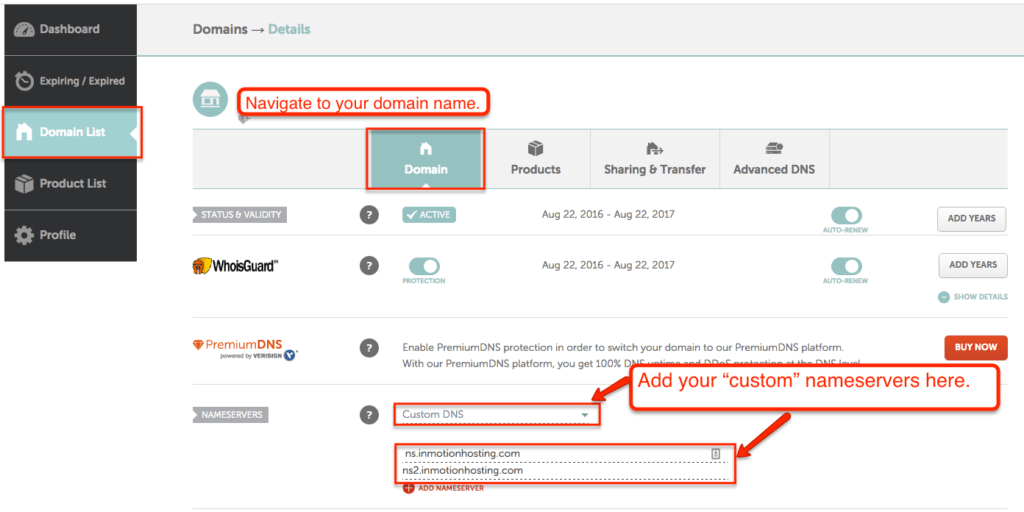
It’s usually simplest to set your nameservers with your hosting company (rather than your domain registrar) since they are the ones actually routing your traffic to folders. However, if you are technically adept, many people use a DNS provider like Google, Cloudflare or others separate from their registrar and hosting company.
But the key part here is that no matter where your DNS name server lives, you still have to set it at your registrar. They are the ones who control all your registration data – and your privacy.
So let’s briefly touch on Domain Privacy and the products around that.
What is Domain Privacy?
Domain Privacy is a product that a domain registrar is authorized to sell under certain regulations. Under the ICANN license agreement, you *must* provide correct contact information with your domain name registration. Your contact information is stored in the public WHOIS database.
This requirement is to correct spam, abuse, and technical issues that can arise with domain names & DNS operation.
The side effect of a public WHOIS database is, well, you can probably guess. This is the Internet after all.
Scrapers, spammers, stalkers, and salespeople have a habit of helping themselves to the public contact information and misusing it. Although sometimes you can use it to find the spammers yourself 🙂
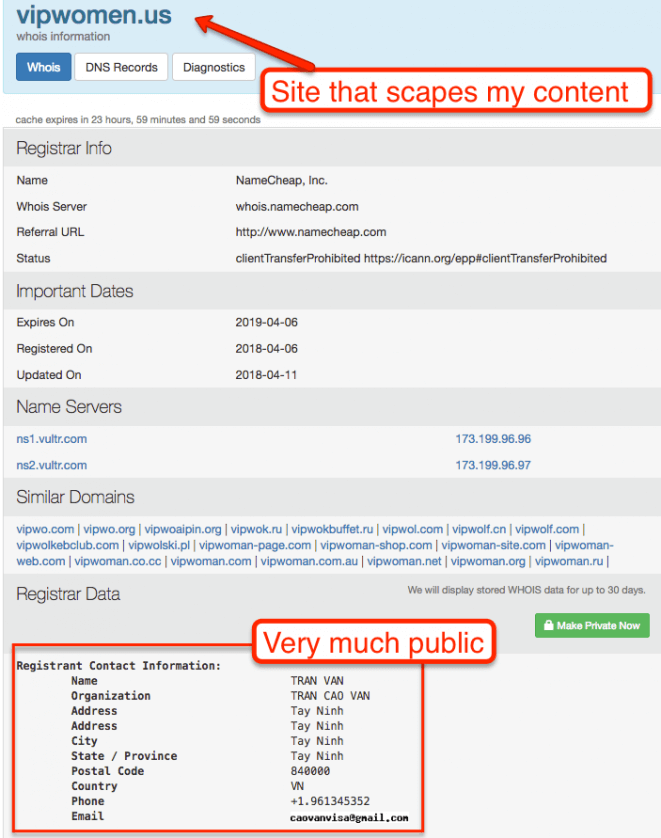
Domain Privacy is meant to solve that issue. Basically, you pay for your registrar to act as a middleman in public. They publish their contact information in place of yours and promise to pass along any important information to you.
Domain Privacy comes at a cost, even though many registrars are starting to bundle it for “free” (i.e., including the base cost in the total cost).
Either way, it’s a good idea and a worthwhile upgrade, if only to reduce spam and random phone calls.
How DNS, Privacy, and Domains Work Together
Here’s how all this works out in a real-life example.
- This site’s domain name is larryludwig.com.
- The domain name is registered at Namecheap with the DNS name servers pointed to my host, InMotion Hosting.
- InMotion’s DNS nameservers are set to direct web traffic to a folder on my VPS Hosting server that will deliver my website files (like this page, all of its images and design). They will also deliver any email sent to [email protected] onward to Google, where I receive my email.
- My registration information lives at Namecheap, where I have WHOIS Privacy Protection. Namecheap can get in touch with me, but no one else can.
That’s how a domain name, DNS, and WHOIS privacy all work together.
But there are still quite a few questions that come up. Here’s how I answer them.
How Much Does A Domain Name Cost?
A domain costs a flat annual fee depending on several factors including the base cost of the top-level domain (TLD), the status of the domain, and your registrars’ business model & markup.
In other words, it depends 🙂
You can expect to pay $10 to $30 per year for an inactive generic top-level domain (e.g., a .com, or .org domain that is not currently registered).
If you are buying a country TLD (e.g., .co.uk or .ca or .tv) or premium TLD (e.g., .ninja or .wedding or .movie) then you can expect to pay a base cost plus the registrar’s model & markup.
If you are buying a domain that is currently registered, then you will have to negotiate a private party price or wait to buy it at auction when it expires. Most big registrars either have their own marketplaces or participate in a domain marketplace.
The quickest way to see how much a domain name costs is to simply search for it. Most of my readers use Namecheap (for their low annual renewal prices and user experience), so I’ve embedded their search tool below.
But you can also use the search tool at domain registrars like GoDaddy (cheap upfront compared to Namecheap) or Hover (focus on support) or even direct at hosting companies who usually offer a free domain (like Bluehost or InMotion Hosting).
Now, the big wild card with domain costs is your registrar’s business model and markup. I’ve written many reviews of different domain registrars.
Every domain registrar is out to make a profit. But they aim to make a profit in different ways. Your job as a consumer is to find one that matches your goals, and remember that if something is too good to be true, then it’s not true. If you get a super cheap domain upfront, then you will pay for it over time. If a company overpromises the world for an expensive domain…you’re probably going to just get an expensive domain.
I’ll cover different providers’ business models below.
Can You Just Buy A Domain Without Hosting?
Yes – you can absolutely buy a domain without buying hosting. In fact, there are a few good reasons to buy a domain without hosting.
- Your project is not ready, but you want to claim your domain name now.
- You want to redirect your domain name to an existing project (ie., on Facebook, Medium, Amazon, elsewhere).
- You want to speculate on a domain name idea. This practice is not as lucrative as in the past, but it is a thing.
- You want to protect a trademark of phrasing.
There are of course plenty of other good reasons, but that is up to you. The point is that you can buy a domain without hosting. You’ll just need to pay the $10 to $20 per year to keep it registered.
I Bought A Domain, Now What?
Once you’ve bought a domain, there are a few things that you can / should do.
If you are setting up a new website, then you’ll also need hosting/website builder/eCommerce platform depending on what you are building. For diversity’s sake, I like to get hosting separate from domains. But, if your domain provider has a good deal (or you want convenience) then you can just follow their onboarding).
Once you’ve bought hosting/website builder subscription, then you’ll need to point your DNS to your hosting company/website builder.

After that, all the remaining steps will happen at your hosting company/website builder.
If you are setting up an email setup or another Internet project, then you can set DNS settings with the DNS nameservers that should be bundled with your registration subscription. You can set MX records for email (ie, Google Workplace) or @ records to point to a live project.
If you need to redirect visitors to an existing project, then you’ll set the 301 records to the target with UTM parameters for tracking.
Popular Domain Name Registrars
| Review | My Rating | Free DNS | Free Privacy | Website |
|---|---|---|---|---|
| Domain.com | 7.5/10 | Learn More | ||
| Dynadot | 8.5/10 | Learn More | ||
| GoDaddy | 7.5/10 | Learn More | ||
| Hover | 7.5/10 | Learn More | ||
| IONOS by 1&1 | 7.0/10 | Learn More | ||
| iwantmyname | 8.0/10 | Learn More | ||
| Name.com | 7.5/10 | Learn More | ||
| Namecheap | 9.0/10 | Learn More | ||
| NameSilo | 7.0/10 | Learn More | ||
| Network Solutions | 6.0/10 | Learn More | ||
| Porkbun | 7.5/10 | Learn More | ||
| Register.com | 6.0/10 | Learn More |
There are a lot of domain registrars on the Internet. They range from big brands like GoDaddy to hip upstarts like Hover to companies that do registration as a complement (like hosting or website builder companies).
They all have tradeoffs. I’ve listed the best domain name registrars.
The key to shopping is to ask yourself what you really prefer. Do you want a cheap first year only to pay more in subsequent years? Do you want phone customer support or is chat fine? Do you want an established brand or a small upstart? Do you want a simple user experience or lots of complementary products? Do you want a wide TLD selection or no? Do you plan on buying a lot of domains or a single one? Do you want the convenience of buying a domain & hosting from one company or do you want the control of buying them separately?
Next Steps
Domain names are very interesting. In many ways, they are a core ingredient to a successful website. In other ways, they don’t really matter (see thefacebook.com, basecamphq.com, and all the other terrible original domains of now big businesses).
But if you have an idea, a project or a need for an online presence, then go grab your domain name and put it to use!
